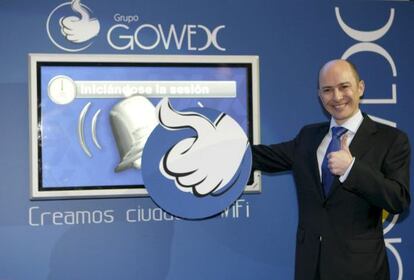How Spanish free wi-fi firm Gowex was brought down by Gotham
Company chief admits that he has been falsifying the accounts for the last four years


Just a week or so ago, Gowex was an example of Spanish innovation, and its president, Jenaro García Martín, was held up as a model entrepreneur. The company installed and maintained free wi-fi in public spaces, such as streets, train stations and newspaper kiosks. It business was growing exponentially, year after year – at least on paper. And its value on the stock market was rising – last Monday it was valued at €1.4 billion. Today, however, it is practically worthless. It turns out that the company was basically a massive scam, as García admitted on Sunday, having confessed in court that he had been falsifying the company’s accounts for at least the last four years to inflate its results.
The bursting of the Gowex bubble will leave hundreds of investors who bought into the company completely trapped. The shares lost 60 percent of their value last week before trading was suspended. And they are likely to lose the remainder of their value, given that the company has already sought protection from its creditors given that it cannot pay its debts.
The bursting of the Gowex bubble will leave investors who bought into the company completely trapped
The next group to lose out from the fiasco is, indeed, the creditors. The company recognized in its 2013 accounts that its financial debt was €29.8 million, double the amount for 2012. The biggest loans, for €8.92 million, came from Spain’s state-owned lender, the Official Credit Institute (ICO). However, the ICO has already clarified that it did not take on any of the risk with these loans, given that the line of credit was granted to a number of unspecified private banks, which then made the loans to Gowex.
Among the company’s other creditors is Spain’s Industry Ministry, which granted soft loans worth €4.8 million; the European Investment Bank (EIB) and the European Investment Fund, which lent €3 million each; and the Center for Technological Industrial Development (CDTI), which is part of the Economy Ministry and lent €420,000 to the firm.
The Madrid regional government signed a contract for wi-fi service in the capital city’s Metro trains
The Madrid regional government was among Gowex’s clients, having signed a contract for it to provide wi-fi service in the capital city’s Metro trains. The city council also has a contract with Gowex for the wi-fi service on municipal buses. Both administrations are due to demand explanations from Gowex’s management to explore how they might be able to tear up their contracts assuming that the company can no longer maintain the service.
Other responsibilities will need to be clarified. The most obvious culprit so far is Jenaro García himself, who on Saturday admitted to the administrative board of Gowex, and then on Sunday in the courts, that he had cooked the books over the last four years, meaning that he is now facing charges of falsifying documents and fraud.
I am willing to assume the consequences and collaborate with the justice system. I am facing up to the situation” Gowex chief Jenaro García Martín
“I have made my voluntary confession in the courts,” he wrote over the weekend on his Twitter account. “I am willing to assume the consequences and collaborate with the justice system. I am facing up to the situation.” He presented his resignation to the company board on Saturday.
While Jenaro García has admitted to falsifying the company accounts, criminal responsibility may lie with other company administrators. The actions of the company’s auditor, M&A, will also be under scrutiny. M&A, which was responsible for the company’s accounts over recent years, is practically unknown among major firms.
Gotham City Research released a devastating report in which it accused Gowex of inflating its results
The credibility of the regulators responsible for Gowex has also taken a battering. The worst affected is the Alternative Stock Market (MAB), where Gowex has been listed since 2010. Its board decided to suspend the company’s listing and demand explanations two days after the scandal broke last week, by which time its stock had already lost 60 percent of its value. Sources from the regulators say MAB heads met at the weekend with the aim of toughening up controls over this type of company.
Gowex, it appears, had escaped any kind of control. And it would have been able to continue its pretense had it not been for Gotham City Research, a mysterious analysis firm that released a devastating report on the company last week in which it accused Gowex of inflating its results, and predicting that it would become the next Pescanova, the Spanish seafood manufacturer that was discovered to have been hiding a billion-euro hole in its accounts. The report by Gotham, entitled “Let’s Gowex: Pescanova Charade,” claimed that the turnover of the company was 90 percent lower than stated in its results, that it was inflating its contracts and that the company’s main clients were firms created by Jenaro García, among other accusations.
Rather than refuting the accusations, Gowex initially tried to disqualify the report, calling it “defamatory,” and claiming that Gotham was aiming to make money by shorting shares in Gowex. In fact, Spain’s CNMV market watchdog has opened an investigation into Gotham, to see whether it has tried to manipulate the market. If it did, it was based on better information than the official regulators had. Were it not for the report from Gotham, Gowex would still be receiving official plaudits, while its shareholders and creditors were being taken closer and closer to ruin.
Only Gotham City got it right
From now on, investors will be keeping a very close eye on any analysis reports published by Gotham City Research. With its own peculiar style, it has shown that it has better information than the majority of analysis firms, which were still recommending the Spanish free wi-fi firm Gowex.
Its 93-page report on the company began with three devastating conclusions: 90 percent of its sales were fake; Gowex shares were worth nothing, and its stock market listing was going to be suspended. It has already been proven right on the latter two predictions.
Its graphic report mixed daring, almost anecdotal deductions with weighty arguments. Among the former, for example, was the claim that it was not surprising that the company was deceiving its shareholders given that the head of investor relations was the wife of the now ex-chief executive, Jenaro García.
It also used as evidence the fact that Gowex’s auditor costs averaged just €50,000 over the last three years, way below the amount paid by other companies with turnover levels similar to those claimed by Gowex, which were normally 10 or 20 times greater.
The analysis becomes more serious as the report continues, questioning how it could be possible that the Spanish company could announce double-digit growth in revenue and profits year after year in a sector such as free wi-fi, which has very low margins and whose principal clients are public administrations. These figures were vastly different from the discrete results of other companies in the sector, such as Boingo, iPass and Towerstream, the majority of which filed losses.
To explain this anomaly, Gotham suggested that the “biggest client of Gowex is, in reality, Gowex itself,” thanks to companies created by García. It also cited the fact that none of the major telecoms operators in Spain – Telefonica, Jazztel, Orange, etc. – had any kind of commercial relationship with Gowex.
It also accused the wi-fi company of inflating the figures for its contracts, such as the deal it signed with the city of New York. Gowex claimed it was worth $7.5 million, when in reality it was no greater than $200,000.
Gotham also doubted the network Gowex claimed to have in place, with 100,000 connection hotspots throughout the world. In fact, it had just 5,000, half of which were shared with other companies and many of which offered very poor coverage.
The report also suggested that revenue declared by Gowex from its advertising activity was false, when compared to that of other companies in the sector operating in much better locations, such as airports.
While Gotham hides behind an extreme level of opacity (no one knows exactly who is behind their movements in the market), its actions have made traditional analysis firms – many of which are backed by banks – look very bad. Even once the report had been made public, 66 percent of these companies continued to recommend buying Gowex shares, with the rest saying they should stay in portfolios.
Tu suscripción se está usando en otro dispositivo
¿Quieres añadir otro usuario a tu suscripción?
Si continúas leyendo en este dispositivo, no se podrá leer en el otro.
FlechaTu suscripción se está usando en otro dispositivo y solo puedes acceder a EL PAÍS desde un dispositivo a la vez.
Si quieres compartir tu cuenta, cambia tu suscripción a la modalidad Premium, así podrás añadir otro usuario. Cada uno accederá con su propia cuenta de email, lo que os permitirá personalizar vuestra experiencia en EL PAÍS.
En el caso de no saber quién está usando tu cuenta, te recomendamos cambiar tu contraseña aquí.
Si decides continuar compartiendo tu cuenta, este mensaje se mostrará en tu dispositivo y en el de la otra persona que está usando tu cuenta de forma indefinida, afectando a tu experiencia de lectura. Puedes consultar aquí los términos y condiciones de la suscripción digital.







































